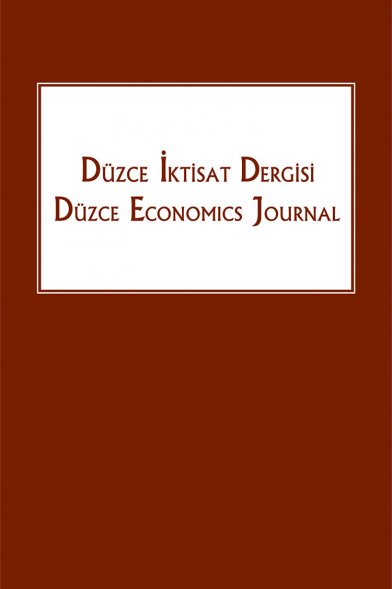İnovasyonların İşsizlik Üzerine Etkisi: Türkiye Örneği
The Impact of Innovations on Unemployment: The Case of Turkiye
Innovation, Unemployment, ARDL.,
___
Akcigit, U. ve Melitz, M. (2022). International Trade and Innovation. Working Paper No.2022-02. Becker Friedman Institute for Economics at Uchicago.
Alam, I. ve Quazi, R. (2003). Determinants of Capital Flight: An econometric case study of Bangladesh. International Review of Applied Economics, 17(1), 85-103. doi:10.1080/713673164
Bilbao-Osorio, B. ve Rodriguez-Pose, A. (2004). From R&D to Innovation and Economic Growth in the EU. Growth and Change, 35(4), 434-455.
Bogliacino, F., Piva, M. ve Vivarelli, M. (2012). R&D and employment: An application of the LSDVC estimator using European microdata. Economics Letters, 116, 56-59.
Coccia, M. (2013). Employment, Innovation and Public Debt Across Economies. African Journal of Business Management, 7(5), 318-330.
Crespi, G. ve Tacsir, E. (2012). Effects of Innovation on Employment in Latin America. Inter-American Development Bank, Institutions for Development (IFD)-(IDB Technical Note ; 496).
Çetin, S. (2022). Araştırma Geliştirme Harcamalarının İstihdam Üzerine Etkisi: Gelişmiş ve Gelişmekte Olan Ülkeler için Bir Karşılaştırma. İstihdam Üzerine Teorik ve Ampirik Çalışmalar. içinde Ankara: Nobel Yayınevi.
Dickey, D. ve Fuller, W. (1979). Distribution of the Estimators for Autoregressive Time Series with a Unit Root. Journal of the American Statistical Association, 427-431.
Durucan, A. ve Ulukök, E. (2022). Ar-Ge Harcamaları, İşsizlik ve Büyüme Arasındaki Nedensellik İlişkisi: Türkiye Örneği. Girişimcilik ve İnovasyon Yönetimi Dergisi, 11(1), 1-27.
Ersöz, F. (2009). Avrupa İnovasyon Göstergeleri (EIS) Işığında Türkiye’nin Konumu. İTÜDERGİSİ/b, 6(1).
Evangelista, R., ve Savona, M. (2002). The Impact of Innovation on Employment in Services: Evidence from Italy. International Review of Applied Economics, 16(3), 309-318. doi:10.1080/02692170210136136
Feldmann, H. (2013). Technological Unemployment in Industrial Countries. Journal of Evolutionary Economics, 23, 1099–1126. doi:10.1007/s00191-013-0308-6
Gerçeker, M., Özmen, İ. ve Mucuk, M. (2020). Ar-Ge Harcamaları ve İşsizlik Arasındaki Nedenselliğin Ampirik Analizi: G7 Ülkeleri Örneği. Marmara Üniversitesi İktisadi ve İdari Bilimler Dergisi, 41(2), 413-431. doi:10.14780/muiibd.665104
Greenan, N. ve Guellec, D. (2000). Technological Innovation and Employment Reallocation. Labour, 547-590.
İğdeli, A. ve Sever, E. (2020). İnovasyonun Genç İşsizlik Üzerindeki Etkisi: Türkiye’de Düzey II Bölgeleri Örneği. Anemon Muş Alparslan Üniversitesi Sosyal Bilimler Dergisi, 8(3), 771–779. doi:http://dx.doi.org/10.18506/anemon.522447
INSEAD. (2010). Global Innovation Index 2009-10. INSEAD.
Kanberoğlu, Z. ve Göçer, M. (2019). Türkiye’de İnovasyonun Genç İşsizlik Üzerindeki Etkisi. International Journal of Economics and Politics Sciences Academic Researches, 3(9), 61-78.
Koellinger, P. (2006). Impact of ICT on Corporate Performance, Productivity and Employment Dynamics. Special Report No. 01/2006. Berlin / Brussels: European Commission.
Lachenmaier, S. ve Rottmann, H. (2011). Effects of Innovation on Employment: A Dynamic Panel Analysis. International Journal of Industrial Organization, 210–220. doi: 10.1016/j.ijindorg.2010.05.004
Matuzeviciute, K., Butkus, M. ve Karaliute, A. (2017). Do Technological Innovations Affect Unemployment? Some Empirical Evidence from European Countries. Economies, 5(48). doi:doi:10.3390/economies5040048
Mercan, B., Göktaş, D. ve Gömleksiz, M. (2011). AR-GE Faaliyetleri ve Girişimcilerin İnovasyon Üzerindeki Etkileri: Patent Verileri Üzerinde Bir Uygulama. PARADOKS Ekonomi, Sosyoloji ve Politika Dergisi, 7(2), 27-44.
Mike, F. ve Mahjoub Laleh, M. (2016). Bilgi ve İletişim Teknolojilerinin İstihdam Üzerine Etkisi: Seçili Ülkeler Üzerine Bir Uygulama. Atatürk Üniversitesi Sosyal Bilimler Enstitüsü Dergisi, 20(2), 601-614.
OECD. (2015). Frascati Manual 2015: Guidelines for Collecting and Reporting Data on Research and Experimental Development, The Measurement of Scientific, Technological and Innovation Activities. Paris: OECD Publishing. doi:http://dx.doi.org/10.1787/9789264239012-en
Outtara, B. (2004). The Impact of Project Aid and Programme Aid Inflows on Domestic Savings: a Case Study of Côte d’Ivoire. Şubat 04, 2023 tarihinde https://citeseerx.ist.psu.edu/viewdoc/download?doi=10.1.1.580.2489&rep=rep1&type=pdf adresinden alındı
Pellegrino, G., Piva, M. ve Vivarelli, M. (2017). Are Robots Stealing Our Jobs? IZA – Institute of Labor Economics-IZA DP No. 10540.
Pesaran, M. H., Shin, Y. ve Smith, R. J. (2001). Bounds Testing Approaches to the Analysis of Level Relationships. Journal of Applied Econometrics, 16(3), 289-326.
Peters, B. (2004). Employment Effects of Different Innovation Activities: Microeconometric Evidence. ZEW Discussion Papers, No. 04-73.
Phillips, P. ve Perron, P. (1988). Testing for a Unit Root in Time Series Regression. Biometrika, 75(2), 335-346.
Pianta, M. (2009). Innovation and Employment. The Oxford Handbook of Innovation /Oxford Handbooks Online. doi:DOI: 10.1093/oxfordhb/9780199286805.003.0021
Pini, P. (1995). Economic Growth, Technological Change and Employment: Empirical Evidence for a Cumulative Growth Model with External Causation for Nine OECD Countries: 1960-1990. Structural Change and Economic Dynamics, 6(2), 185-213. doi:10.1016/0954-349X(94)00008-W
Rottmann, H. ve Lachenmaier, S. (2007). Employment Effects of Innovation at the Firm Level. Weidener Diskussionspapiere, No. 3.
Schumpeter, J. (1911). The Theory of Economic Development. Cambridge, MA: Harvard University Press.
Schumpeter, J. (1934). The Theory of Economic Development. Boston, MA: Harvard University Press.
Seçilmiş, N. ve Konu, A. (2019). OECD Ülkelerinde Ar-Ge Teşvikleri ve İnovasyon İlişkisi Üzerine Ampirik Bir İnceleme. Kahramanmaraş Sütçü İmam Üniversitesi Sosyal Bilimler Dergisi, 16(2), 686-702. doi:10.33437/ksusbd.533175
Smolny, W. (1998). Innovations, Prices and Employment: A Theoretical Model and an Empirical Application for West German Manufacturing Firms. The Journal of Industrial Economics, 46(3), 359-381.
Taymaz, E. (1997). Türkiye İmalat Sanayiinde Teknolojik Değişme ve İstihdam. Ankara: Teknoloji ve İstihdam.
Ünlü, F. (2022). Türkiye’de Bilgi ve İletişim Teknolojilerinin İşgücü Verimliliği ve İstihdam Üzerindeki Etkileri: ARDL Sınır Testi Yaklaşımı. İstanbul İktisat Dergisi- Istanbul Journal of Economics, 72(2), 725-751. doi:https://doi.org/10.26650/ISTJECON2021-1091191
- ISSN: 2757-6558
- Yayın Aralığı: Yılda 2 Sayı
- Başlangıç: 2020
- Yayıncı: Şerif CANBAY
